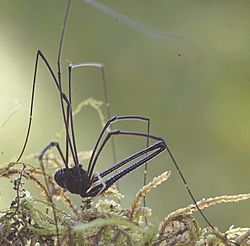Neopilionidae facts for kids
Quick facts for kids Neopilionidae |
|
|---|---|
 |
|
| Pantopsalis listeri | |
| Scientific classification | |
| Kingdom: | |
| Phylum: | |
| Class: | |
| Order: | |
| Suborder: |
Eupnoi
|
| Superfamily: |
Phalangioidea
|
| Family: |
Neopilionidae
Lawrence, 1931
|
| Diversity | |
| 19 genera, 78 species | |
The Neopilionidae are a family of harvestmen. These small creatures are often called "daddy longlegs." However, they are not spiders, even though they are related to them.
You can find these harvestmen in places like Australia, South Africa, and South America. This wide spread across continents is a clue. It suggests they are very old, dating back to when these landmasses were joined. This ancient supercontinent was called Gondwana. These animals are like living reminders of that distant past.
Members of this family vary in size. Some are tiny, like Americovibone lancafrancoae, which is less than 1 millimeter long. Others can grow to more than 4 millimeters. A few species in the Enantiobuninae group have a rare blue color. This is very unusual for harvestmen!
Another group, once known as "Monoscutidae", is now part of the Enantiobuninae subfamily. Scientists often update how they group animals as they learn more.
What's in a Name?
The name "Neopilionidae" has an interesting meaning. It comes from two parts. "Neo" is from Ancient Greek and means "new." "Opilio" is a Latin word. It refers to a type of harvestman. So, the name basically means "new harvestmen."
Family Groups and Species
Scientists organize living things into different groups. This helps us understand how they are related. The Neopilionidae family is divided into smaller groups called subfamilies.
According to the Catalogue of Life, the Neopilionidae family has three subfamilies. These subfamilies contain a total of 19 different groups called genera. Within these genera, there are 78 known species.
- Ballarrinae Hunt & Cokendolpher, 1991
- Americovibone Hunt & Cokendolpher, 1991
- Arrallaba Hunt & Cokendolpher, 1991
- Ballarra Hunt & Cokendolpher, 1991
- Plesioballarra Hunt & Cokendolpher, 1991
- Vibone Kauri, 1961
- Enantiobuninae Mello-Leitão, 1931 (includes Monoscutidae)
- Acihasta Forster, 1948
- Australiscutum Taylor, 2009
- Forsteropsalis Taylor, 2011
- Mangatangi Taylor, 2013
- Megalopsalis Roewer, 1923
- Monoscutum Forster, 1948
- Neopantopsalis Taylor & Hunt, 2009
- Pantopsalis Simon, 1879
- Spinicrus Forster, 1949
- Templar Taylor, 2008
- Tercentenarium Taylor, 2011
- Thrasychiroides Soares & Soares, 1947
- Thrasychirus Simon, 1884
- Neopilioninae Lawrence, 1931
- Neopilio Lawrence, 1931
See also
 In Spanish: Neopiliónidos para niños
In Spanish: Neopiliónidos para niños
 | Laphonza Butler |
 | Daisy Bates |
 | Elizabeth Piper Ensley |

